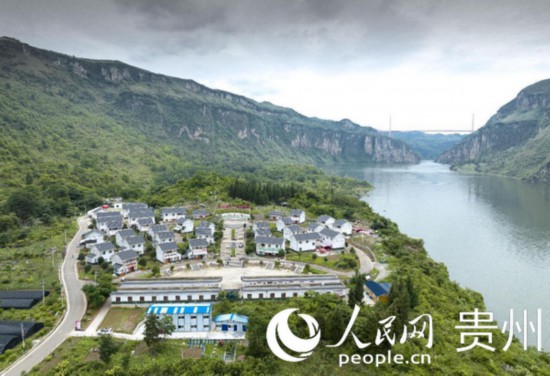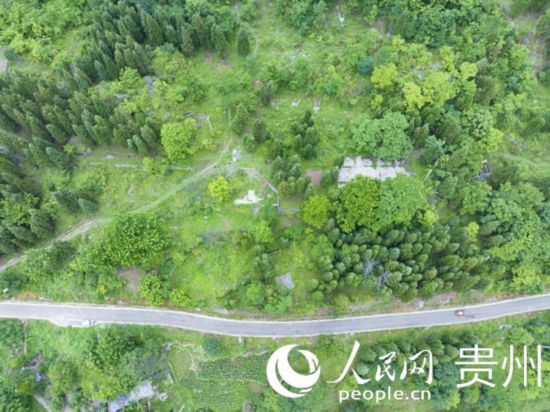Standing on the observation deck, overlooking Wujiangyuan Baili Gallery, among the layers of clouds, there are rows of characteristic houses, picturesque landscapes, cruise ships passing through the blue waves, and tourists coming and going in an endless stream. Here, it is Huawu Village, Xinren Miao Township, Qianxi City, Bijie City, Guizhou Province (the county was withdrawn and the city was established on May 10, 2021).
Huawu Village, formerly known as "Huawuji", means "village under the cliff". It is a small mountain village that was blocked by cliffs in the past and was once a state-level deep poverty village. Since the 18th National Congress of the Communist Party of China, with the continuous and precise efforts of a series of policies to benefit the people, Huawu Village has undergone earth-shaking changes, successfully removing the poverty "hat" and becoming a key village for rural tourism in Guizhou.

Corner of Huawu Village. People’s Network Long Zhangyu photo
Taking the "fast train" of rural tourism development, Huawu Village, under the planning of the government and the development of villagers, relies on a good natural environment to vigorously develop tourism and Miao Xiu industries, and is changing from a single eco-tourism model to a variety of tourism formats. This small village, which used to go over mountains and mountains, has successfully embarked on a road of rural revitalization with rich development characteristics.
Butterfly change: a poor mountain village takes on a new look
Going out of the mountain to "pick rocks by hand", drinking water on the back of the river and living in thatched cottages were once a true portrayal of Huawu Village.
Blocked by mountains, the former Huawu village had a bad environment and blocked information, and the villagers relied on self-sufficiency in food, clothing, housing and transportation. To make matters worse, the Wujiang River once sounded the "alarm" of the water ecological environment due to overfishing and deforestation, and the already fragmented land began to rocky desertification, making people’s lives increasingly difficult.
"Poverty, at that time, there happened to be a reservoir resettlement policy, and many people chose ‘ Escape ’ And those who stay can only stick to it. " Yang Long, a villager in Huawu Village, clearly remembers that before 2012, many people moved out, and when his playmates grew up, he personally gave them away.

Tongzu Road in Huawu Village. People’s Network Long Zhangyu photo
The change of the house originated from the "road". From the initial "Maolu" to the asphalt highway and then to the tourist highway, a road has strung together thousands of households, which has made the villagers see the outside world, broadened their horizons and increased their knowledge. They made up their minds to plant trees and vowed to restore green mountains and rivers.
After a few years of hard work, more than 1,000 acres of fruit trees are lush and fruitful, and new saplings have grown in the crevices between the mountains. The once barren hillside has gradually recovered its greenery. In 2017, Huawu Village successfully removed the hat of deep poverty village; At the end of 2019, the poor population was cleared.
At the same time, the clean-up work of cage culture has also been carried out in Huawu Village. Village cadres went door to door to explain the fishing ban policy and persuade fishermen to go ashore. By the end of 2018, all 32 cages in Huawu Village had been dismantled, and 12 fishermen had switched to production, with a conversion rate of 100%.
"In addition to comprehensively arranging our family situation, the village has also collected many policies on employment, entrepreneurship, skills training and social security for retired fishermen to help everyone change jobs." Yang Qingxin was born and raised as a homebody. In the past few decades, he has been fishing in the six red section of Wujiang River for a living. After the introduction of the no-fishing policy, Yang Qingxin went ashore and became a river guard, earning a steady income of 3,000 yuan per month.

Scenery of Wujiang Baili Gallery beside Huawu Village. People’s Network Long Zhangyu photo
After the improvement of the ecological environment, the housebuilders with green mountains and green waters will naturally not miss it. Many villagers who moved out of the reservoir area chose to move back to the old site and build their homes together. As a result, the people who renovated their houses, skillfully changed their courtyards, and learned to cook, seized the opportunity and made preparations for eating "tourist meals".
塑形:多产融合促发展
作为化屋村较早“吃螃蟹”的人,杨龙因为当过一届村主任,眼光总是比别人看得长远。在化屋村餐饮民宿未兴起前,有游客反映没吃没住,杨龙便动员村民利用自身优势发展旅游,奈何反响平平。
守着绿水青山过穷日子?杨龙不甘心,在2019年将自家房屋打造成集住宿、餐饮于一体的综合空间。尽管吸引了一些游客,但大多村民还是对旅游持观望态度。
转机源自2021年2月3日,习近平总书记到化屋村考察调研,这个名不见经传的小村庄,一下子“火”遍全国。大量游客的涌入,激发了村民的发展信心。

2021年2月3日至5日,中共中央总书记、国家主席、中央军委主席习近平来到贵州考察调研,看望慰问各族干部群众,向全国各族人民致以美好的新春祝福。这是3日下午,习近平在毕节市黔西县新仁苗族乡化屋村文化广场上,向全国各族人民、港澳台同胞和海外侨胞拜年。新华社记者 李学仁摄
一家、两家、三家……化屋村的餐饮民宿有了新变化,农家乐和民宿分别有33家和18家;村民的生活也发生了大转变,人均年收入从2012年的2400元左右提升至2021年的19304元,乡村旅游发展风生水起。
住宿和餐饮快速发展的同时,化屋村也在苦练“内功”,走坚定文化自信之路。“很多游客对苗族服饰、各类装饰品赞不绝口,强烈激发了百姓的文化认同。”毕节市发改委派驻化屋村第一书记常开林告诉记者,瞅准了发展机遇,化屋村通过开办刺绣蜡染扶贫车间等方式,传承和发扬苗族文化,带动百姓增收。
化屋村以苗族为主,是中国民间文化艺术之乡。习近平总书记到化屋考察时,走进扶贫车间,了解发展特色苗绣产业、传承民族传统文化等情况。“苗绣既是传统的也是时尚的,你们一针一线绣出来,何其精彩!”习近平总书记勉励大家,一定要把苗绣发扬光大,这既是产业也是文化,发展好了既能弘扬民族文化、传统文化,同时也能为产业扶贫、为乡村振兴作出贡献。
习近平总书记为苗绣点赞,这让苗族“绣娘”杨文丽激动不已。“刺绣蜡染是苗族传统文化,我要通过自己的努力,帮助更多村民实现在家门口就业,将这一技艺传承好,争取让其成为世界的艺术。”杨文丽是这样说的,也是这样做的。

Miao Xiu products. People’s Network Long Zhangyu photo
In order to make embroidery products more widely used, Yang Wenli’s poverty alleviation workshop was not limited to ethnic costumes, but set up a professional design team to combine tradition and fashion, and integrate embroidery batik into costumes, sachets and other designs, so that products are exported to all parts of the country. In 2021, Yang Wenli sold 1.6 million yuan of embroidered batik products "online and offline" to help more than 60 local embroidered mothers achieve employment.
In addition, Huawu Village also has special food — — Huang ba. In order to let more tourists and consumers taste this traditional food, the "two committees" of Huawu village branch led the cooperative through the village party branch and opened the huang ba processing factory. On May 1, 2022, huang ba Processing Factory in Huawu Village was officially put into operation. At present, it has sold more than 160,000 kilograms of huang ba with a sales volume of 1.66 million yuan, which has driven more than 30 villagers to find jobs nearby.

Huawu Village develops huang ba’s industry and promotes villagers’ employment. People’s Network Long Zhangyu photo
Strengthen the eco-cultural tourism infrastructure of Wujiang Yuanbaili Gallery, build a Miao Xiu workshop for more young people to pick up needlework again, and make good use of the huang ba processing workshop to drive the surrounding villagers to stabilize their employment … … Huawu Village is committed to making a big article on the integration and development of diversified industries. A number of projects, such as Huawu Visitor Center, Ecological Camp, New Energy Cruise, Sightseeing Carriage, Kangyang Residential Accommodation, are being promoted one after another.
Casting Soul: Civilization, Fresh Wind and Moisturizing Home
"The development of tourism, unified standards is the key. The original intention of our association was to regulate the tourism market. " Yang Ye used to be a teacher and an early homestay owner in Huawu Village. His association is Huawuji Catering Homestay Association.
In order to highlight the characteristics of Huawu and prevent uncivilized tourism phenomena such as shoddy goods, bullying customers and slaughtering customers, Huawu Village established Huawuji Catering B&B Association according to the wishes of the people. Many villagers joined the "big family" of the association and standardized from the most basic standards of food and shelter.
An association, but not simple. As far as eating is concerned, Huawu Village has made great efforts in the research and development of special dishes, and established a leading group for the research and development of special dishes in Huawu Village, Qianxi City, headed by the Standing Committee of Qianxi Municipal Committee and the Minister of Propaganda, to create traditional Huawu farm dishes with characteristics and enhance tourists’ rural travel experience.

Huawu Village develops the tourism industry and attracts tourists to "punch in". People’s Network Long Zhangyu photo
In the specific implementation process, the food R&D team made clear the 16 special dishes that must be cooked, and specified the materials used for each dish in detail, so that each farmhouse can accurately grasp the standard and quality of the dishes and satisfy the tourists.
"Although no complaints have been received so far, it is better to standardize etiquette training and evaluate pricing by the association." Now, Yang Ye is the president of Huawuji Catering B&B Association. He said that he hoped that the villagers would take tourism as a long-term career and do a good job in all kinds of services, so that tourists can enjoy high-standard tourism services while enjoying the beautiful scenery, and really start the brand of plastic house tourism.
这边,协会工作开展如火如荼;那边,生态环境保护热火朝天。“听到游客夸化屋的生态好,我们也很自豪。”打鱼近30年的尤荣利从没想过,“舟行碧波上,人在画中游”这样诗意的画面就在家门口,而自己正在为如此美景贡献力量。
2017年,尤荣利响应退捕号召转产上岸,与两兄弟一拍即合,成立了船务公司,从此渔船变游船。2021年,尤家2条船为三兄弟带来80多万元的收入。也正因如此,尤家三兄弟格外爱护这片山水。
“每次河面因涨水产生垃圾,我们都会驾驶河道垃圾清理船义务去清理。”尤荣利说,尽管每次清理垃圾都要花费近千元油费,但他们乐在其中,因为这是环境优美和游客满意的“双赢”。

化屋村“乡村振兴 共同富裕”几个字引人注目。人民网 龙章榆摄
“贵州真是山好水好,一定要保护好这片绿水青山。”贵州之行,习近平总书记来到化屋码头,沿江岸步行察看乌江生态环境和水质情况。他强调,要牢固树立绿水青山就是金山银山的理念,守住发展和生态两条底线,努力走出一条生态优先、绿色发展的新路子。
Adhering to ecological priority and green development, the Youjia three brothers are a microcosm of the villagers’ active participation in rural governance. As rural tourism continues to heat up, the housebuilders who are rich in scenery pay more attention to the protection of ecological environment, forming a good atmosphere of catching up and learning. "When the trash can is full, people who are ready to throw garbage will take their garbage home, and they will not pile it up everywhere. Everyone will also supervise each other and jointly care for the environment of the housebuilder." Chang Kailin is quite proud.
Nowadays, the environment is beautiful, the days are rich, and life is more and more exciting. The villagers are more and more willing to "develop rural industries well, protect the ecological environment well, carry forward national traditional culture well, give full play to the effectiveness of social governance, and build grass-roots party organizations well". A picture of rural revitalization with prosperous industries, livable ecology, civilized rural customs, effective governance and rich life is slowly unfolding in Huawu Village. (Wang Qin, Wang Xiufang)